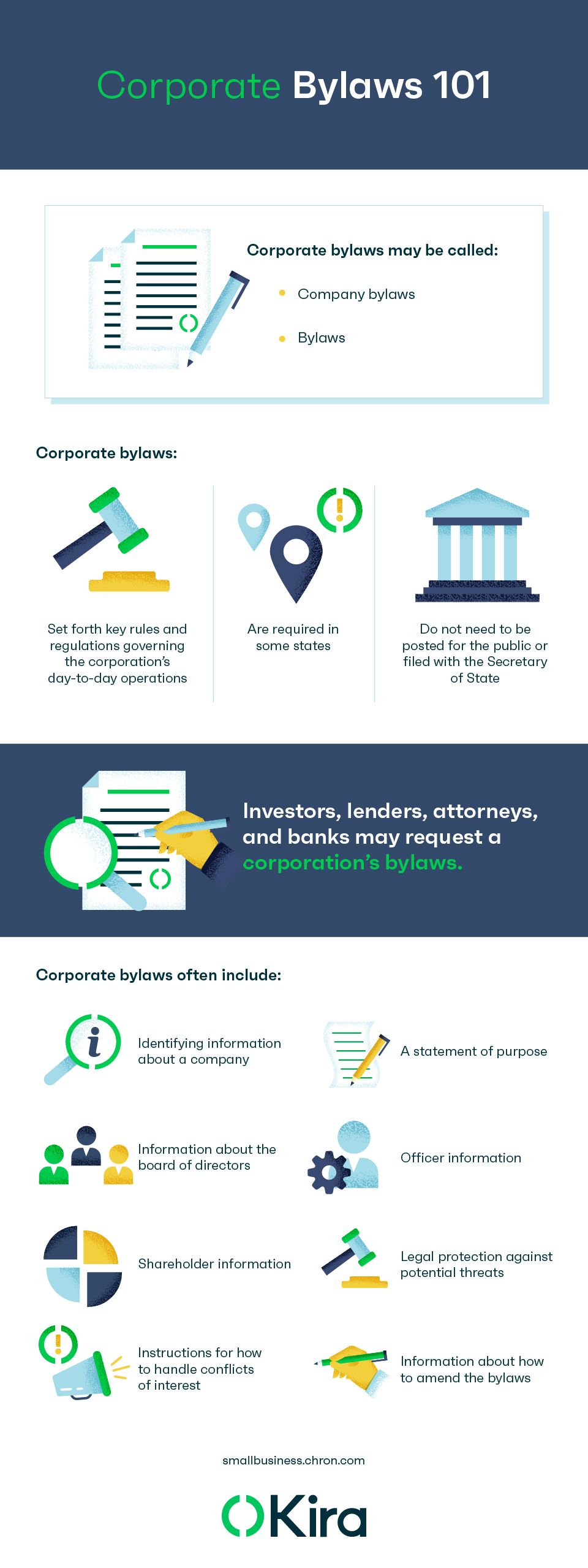A corporation’s bylaws, also called company bylaws or just bylaws, are a legal document setting forth key rules and regulations governing the corporation’s day-to-day operations. By articulating the procedures management must follow, these rules help ensure a corporation runs smoothly, efficiently, and consistently.

In most states, corporations must maintain bylaws. Because of this, and because they are important in a corporation’s organization, the board of directors often draft them at the time of founding. Unlike articles of incorporation, though, bylaws are not public and do not need to be filed with the Secretary of State. However, investors, lenders, attorneys, and banks may request the corporation’s bylaws.
The information corporations should include in their corporate bylaws varies by state. For instance, some states such as New York have no rules about what must be in a corporation’s bylaws. Other states such as Delaware stipulate that the bylaws should include certain information.
Standard Information in Corporate Bylaws
Below, find some commonly included provisions.
Identification information about the corporation
Companies should include certain basic information about the corporation in the bylaws, such as:
- The corporation’s name
- Office location(s)
- Principal place of business
- The fiscal year
- Whether the company is public or private
Statement of purpose
When company founders include a statement of the company’s purpose in the corporate bylaws, current and future corporate managers, investors, and partners can better understand why the company was founded and assess whether business opportunities align with the stated purpose.
The statement of purpose should answer questions such as:
- Why was this company incorporated?
- How does it set itself apart from competitors?
- Who are its primary customers?
- How does the company plan to serve them?
A statement of the company’s purpose is particularly important for nonprofit corporations, as it helps the IRS and other government agencies determine whether the company qualifies for special tax-exempt status such as a 501(c)(3) or 501(c)(4) corporation.

Information about the board of directors
The board of directors is the primary governing body of the corporation, and every corporation must have one. The bylaws should specify:
- The number of directors or a maximum or minimum number of directors
- Their qualifications
- Their duties
- The length of their terms
- How vacancies are filled; for instance, whether they can be filled by the board, members, or shareholders
Every corporation should have regular management meetings to develop initiatives, address issues, and discuss the company’s current status. The bylaws set forth where and when those meetings take place. For example, they could be quarterly or the second Tuesday of every month at 7 pm at the head office. Corporations may wish to include provisions for meetings taking place virtually or specify whether directors can take action by written consent if state law allows. The bylaws should also include how many directors must be present to make a quorum. Typically, a simple majority of directors constitutes a quorum, but the bylaws can specify otherwise.
Bylaws may also specify the creation of board committees or subcommittees, which focus on specific aspects of the corporation’s business or mission. Common committees include executive and nominating committees, but corporations can create any committee in line with its purpose or goals.
Officer information
The board of directors selects officers to manage the daily operations of the company. Most corporations will have a chief executive officer, chief operations officer, and chief financial officer.
The bylaws should include provisions for:
- Electing, appointing, and removing officers
- Officers’ place in the reporting hierarchy
- Responsibilities
- Salaries
- Filling vacancies
Shareholder information
Shareholders, or stockholders, are owners of the company who have exchanged assets for shares or stocks.
Companies should include information about shareholder meetings in the corporate bylaws, including:
- When the corporation will hold annual shareholder meetings
- How the corporation will notify shareholders about the meetings
- The quorum required
- The order of business that the meetings will follow
Depending on state law, corporations can also include provisions for shareholders to take action by written consent.
The bylaws should also specify the process by which shareholders can petition for special meetings. Some states have specific requirements about shareholder meetings, which founders should consult before preparing corporate bylaws.
Protection against threats
Corporate bylaws can also provide important legal protections against potential corporate threats, such as a hostile takeover, a process where an acquiring company attempts to control a publicly traded company without the consent of the board of directors. Companies can protect themselves by using “poison pill” defenses to try to make themselves less attractive to an acquiring company. The most common type of poison pill protection is a “flip-in” provision, which allows existing shareholders to acquire shares of the company at a discount. It’s triggered when an acquiring party surpasses a certain percentage ownership of the company. When shareholders flood the market with new shares, it dilutes the ownership of the individual or company attempting to take over and makes it more expensive to buy enough shares to get a majority position.
Depending on the state of incorporation, founders can include other provisions in a corporation’s bylaws to protect the company against expensive litigation, such as including a forum selection clause or requiring mandatory arbitration in the event of a legal dispute.
Conflicts of interest
A corporation’s bylaws should also disclose what to do in the event of a conflict of interest. For instance, if the corporation is contemplating acquiring another company and a member of the board of directors owns the target company, the rules should specify that the conflicted director must sit out discussions relating to any potential acquisition.
Amendments
As companies grow and change, the bylaws should grow and change too. For that reason, bylaws should contain information about how to amend them. Generally, bylaws require a supermajority to amend the bylaws – either two thirds or three fourths of the voting members.
Conclusion
Corporate bylaws are important legal documents that set the course for the corporation’s future. Companies should carefully draft bylaws and make sure they are compliant with the law of the state of incorporation.
Ali Wilkinson is a lawyer and writer based in Portland, Oregon. She has been practicing law for over 15 years, working with clients across a wide range of specialties from accounting malpractice to victims’ rights. This article was originally posted Kirasystems.com

